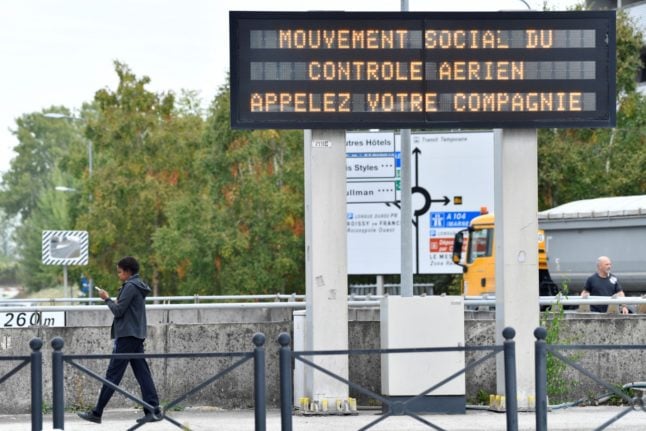On Wednesday morning, the main air traffic control union the SNCTA announced that Thursday’s strike would be called off after reaching an agreement.
Nevertheless, widespread disruption is still expected on Thursday, April 25th – this is because of both the last-minute cancellation of the strike and the fact that some smaller unions are maintaining their strike action.
At some airports, up to 75 percent of flights in and out will be cancelled, while the disruption will also affect overflights. The budget airline company, Ryanair, has estimated that at least 300 of its flights passing over France would have to be cancelled.
“Thursday remains a ‘black day’”, warned Thomas Juin, President of the Union of French Airports.
“Unfortunately, the impact for Thursday remains significant, as we are now just a few hours away from the strike day, and the civil aviation authority is not in a position to make any significant changes to the cancellations that were planned.”
So where will the impact be the worst?
Individual staff members must inform bosses of their intention to strike – staffing numbers are then used by the French civil aviation authority the DGAC to work out how many flights can safely take off and land from each airport.
Airports are then given a percentage of how many flights they must cancel – precisely which flights are cancelled is up to airlines to decide. Airlines usually try to prioritise long-haul flights to minimise disruption.
Anyone scheduled to fly in and out – or over – France on Thursday should check with their airline before travelling to the airport.
Even after the cancellation of the SNCTA action, the DGAC estimates that there will still be widespread cancellations;
- Paris Orly airport – 75 percent of flights cancelled
- Paris Charles de Gaulle – 55 percent of flights cancelled
- Marseille – 65 percent of flights cancelled
- All other airports – on average 45 percent of flights cancelled
The widespread cancellations mean that it’s likely that there will be knock-on effects into Friday.
Compensation
Some airlines offer free cancellation or rescheduling of flights on days that strikes are called – individual terms are down to the airline (eg whether travellers get money back or vouchers to use at a later date).
If your flight is delayed or disrupted by strike action you may be entitled to compensation, depending on whether your airline in based in, or took off from, an EU country.
READ ALSO What are my rights if my flight is disrupted?
Overflights
Because the strike is by air traffic controllers, it will also affect flights that pass through French airspace on their way to another country, known as overflights.
These make up a significant percentage of the flights handled by French air traffic controllers on a daily basis – in the case of overflights they are more likely to be delayed or diverted as airlines seek alternatives routes that go around France, rather than over it, but there may be some cancellations.
This is why budget airline company Ryanair said it was forced to cancel 300 of its flights set to fly over French airspace on Thursday. According to their estimations, this will affect 50,000 passengers in some way, with the most disrupted flights being those flying over France to get from the UK to Greece, Spain, and Italy.
Travellers should check with their airline to verify the status of their flight.



 Please whitelist us to continue reading.
Please whitelist us to continue reading.
Member comments